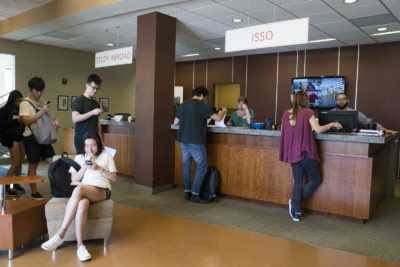
The Trump Administration announced its plan to rescind the Deferred Action for Childhood Arrivals program on Sept. 5 — a decision that could put the educational and professional opportunities for undocumented students at risk, according to Sarah Sherman-Stokes, the associate director of the BU Immigrants’ Rights and Human Trafficking Clinic.
The announcement from Attorney General Jeff Sessions raised serious concerns for many undocumented young people. This includes university students, who were implicitly told that DACA, the program that offered them temporary protection from deportation, was unlawful and unconstitutional, said Sherman-Stokes, who disagrees with Sessions.
Sherman-Stokes, along with more than 100 other lawyers, signed and sent a letter to Trump last month, explaining the legal justification for DACA with the goal of potentially swaying his decision on how to handle it.
Regardless of the legality of the program, DACA was terminated and Congress was given six months to develop comprehensive immigration reform — which is something they have been working on for more than a decade, Sherman-Stokes said.
“It doesn’t seem to me that Congress is going to be cooperating all of a sudden to be able to [establish immigration reform],” Sherman-Stokes said. “It’s not completely clear what the next steps are going to be for these young people who have been relying on this program and who have been going to school and working.”
BU is attempting to support any undocumented students who are protected by DACA while remaining lawful and cooperative with immigration enforcement, said Jeanne Kelley, the managing director of the International Students and Scholars Office at BU.
“DACA students on campus should rest assured that BU will not provide information to any third party unless specifically compelled to do so by a warrant or subpoena,” Kelley said. “We will continue to provide advice and counsel on a case-by-case basis to students who self-identify as undocumented and come forward to seek our counsel.”
The ISSO is urging undocumented students to get in touch with them to ensure that they are doing everything they can to assure their legal protection, Kelley said.
“We would encourage DACA students to reach out to the ISSO staff if they have questions so that we can make sure they are receiving accurate legal advice from experienced immigration attorneys,” Kelley said.
ISSO’s website has a page called Resources for Undocumented Individuals that offers DACA students information on how to manage their situation, including work permission and DACA renewal deadlines, as well as links to confidential counseling and other resources, according to Kelley.
“We are a university that is committed to having an open and welcoming atmosphere to students from across the United States and around the globe,” Kelley said. “President Brown and members of the administration continue to advocate in support of DACA students as well as for legislative action leading to a permanent solution that will enable these students to remain in the United States to fulfill their educational and professional goals.”
Several students said they think the repeal of DACA was the wrong decision by the Trump administration and that BU should take concrete steps to support students who may be affected by the policy change.
Zach Joachim, a Graduate School of Arts and Sciences fourth-year doctoral student, said he thinks making BU a sanctuary campus, as other schools have done, would be the right decision by the university administration.
“It’s the easy decision here, to kind of take a moral stance, because [the repeal of DACA] is almost universally opposed, and this kind of thing can only be good for BU’s administration,” Joachim said.
Sherman-Stokes, who specializes in immigration law and policy, said although she thinks these types of movements are important, sanctuary campuses and cities are not necessarily sufficient in safeguarding undocumented students.
“Immigration enforcement certainly will still happen and can still happen [on sanctuary campuses],” Sherman-Stokes said. “It’s up to student-organizing efforts, I think, and hopefully support from faculty and staff and the administration at BU to determine whether that will happen.”
Samar Raghib, a Questrom School of Business senior, said she thinks students who were protected by DACA should be allowed to stay in the United States and that they should be protected by BU.
“When people are brought here by their parents at such a young age,” Raghib said, “they don’t really have a say on what happens, and when they grow up here, this becomes their home … I think [BU] should make an effort to protect the kids that are under DACA right now.”
Elena Bernstein, a College of Arts and Sciences sophomore, said she thinks the dissolution of the DACA program is unjust and that the university should protect those who benefited from it.
“It’s unfairly affecting a lot of people — particularly a lot of younger people, like college-aged students,” Bernstein said. “President Brown and the administration in general should do more to assure that they deal with these things in an effective manner … because people are here for an education and you don’t want anything to disrupt that.”























































































































